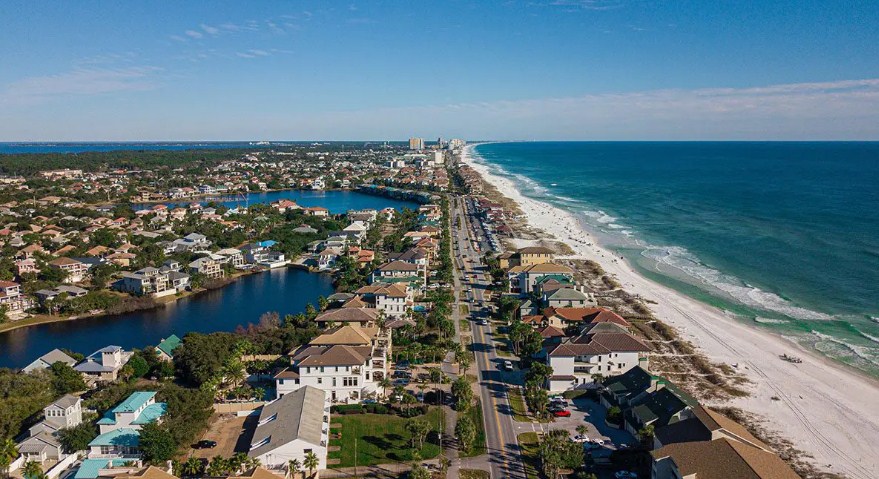The Florida Panhandle is becoming an increasingly popular place to live, with its beautiful beaches, warm weather, and friendly Southern charm. However, before making the move to this southern paradise, it’s essential to understand the pros and cons of living there. This article will take a detailed look at the advantages and disadvantages of living in the Florida Panhandle.
The Climate and Natural Landscapes
The Florida Panhandle boasts a subtropical climate, which means the winters are mild, and summers are warm. The region also has beautiful coastlines, crystal clear waters, and white sandy beaches. On the other hand, the area is prone to hurricanes and thunderstorms, which can be quite dangerous.
Moreover, the region’s natural beauty can bring problems such as sunburn, bug bites, and other hazards that come with spending a lot of time outdoors. Those who are not used to high humidity levels may also find it hard to acclimate to living in the Panhandle, causing discomfort, and difficulty in performing activities.
Cost of Living
Compared to some southern states like California and New York, the Florida Panhandle has a relatively lower cost of living. Property tax rates are lower, and there are no state income taxes. Additionally, food, transportation, healthcare, and other basic utilities are affordable.
However, living in highly-sought-after areas like Miami Beach and Santa Rosa Beach can be more expensive. The overall housing prices are also increasing, and it may be sometimes challenging to find a place to rent or buy.

Education and Job Opportunities
Florida offers several public and private universities, community colleges, and technical schools throughout the state, including the Panhandle region. Additionally, the region is home to a variety of employers in different sectors such as health care, military, manufacturing, and hospitality.
Nonetheless, the job opportunities may not be as varied as in larger cities, and finding well-paying jobs can sometimes be difficult. The education system varies from district to district, and some areas can have limited school options.
Traffic and Commute Times
Compared to major cities in the US, the Panhandle has less traffic and shorter commute times. The streets are relatively calm and much more comfortable to drive than other states like California and Massachusetts. While traffic is not a significant issue, some busy areas can get congested during peak hours.
Community and Culture
The Florida Panhandle is widely known for its unique and friendly Southern culture. People are welcoming, and the communities are tightly knit, making it easy to make friends and connections. Additionally, the region is rich with cultural festivals, outdoor events, and activities that can be enjoyed by everyone, regardless of age.
However, living in a tight-knit community could result in gossip and small-town politics. One may find it hard to make friends if they have a hard time fitting in with the existing community culture, limiting their social circle.
Crime Rates and Safety
While the Panhandle region has state of the art law enforcement systems, crime rates vary depending on the specific areas. Certain neighborhoods have been known to be more susceptible to crime, with break-ins and assaults being a concern for residents.
Conclusion:
In conclusion, living in the Florida Panhandle is a mix of advantages and challenges. The weather is great, the cost of living is affordable, and the community is welcoming. However, the area is prone to natural hazards like hurricanes, finding well-paying jobs can be hard, and some neighborhoods have a higher crime rate than others.
Living in the Florida Panhandle region takes some getting used to, but it’s a beautiful place for those who desire a laid-back lifestyle and love spending time outdoors. Before making the move, research the region’s different areas and assess your priorities to ensure that it’s the right fit for you.
FAQ
FAQ 1: Is the Florida Panhandle a good place to live?
It depends on individual preferences. The Florida Panhandle has a subtropical climate, beautiful coastlines, and a friendly community. However, the region is prone to hurricanes and thunderstorms, finding well-paying jobs can be difficult, and some neighborhoods have a higher crime rate than others. Consider your priorities before making the decision to move.
FAQ 2: What is the cost of living in the Florida Panhandle?
Compared to some southern states like California and New York, the Florida Panhandle has a relatively lower cost of living. Property tax rates are lower, and there are no state income taxes. Additionally, food, transportation, healthcare, and other basic utilities are affordable. However, living in highly-sought-after areas like Miami Beach and Santa Rosa Beach can be more expensive.
FAQ 3: Are there good job opportunities in the Florida Panhandle?
The Panhandle region is home to a variety of employers in different sectors such as health care, military, manufacturing, and hospitality. However, the job opportunities may not be as varied as in larger cities, and finding well-paying jobs can sometimes be difficult. It’s important to research the job market in your desired area before making the move.
FAQ 4: Is the education system good in the Florida Panhandle?
Florida offers several public and private universities, community colleges, and technical schools throughout the state, including the Panhandle region. However, the education system varies from district to district, and some areas can have limited school options. It’s recommended to research the schools in your desired area before making the move.
FAQ 5: Is the community welcoming in the Florida Panhandle?
Yes, the Florida Panhandle is widely known for its unique and friendly Southern culture. People are welcoming, and the communities are tightly knit, making it easy to make friends and connections. However, living in a tight-knit community could also result in gossip and small-town politics. It’s important to consider your preferences and priorities before deciding if the community is the right fit for you.
